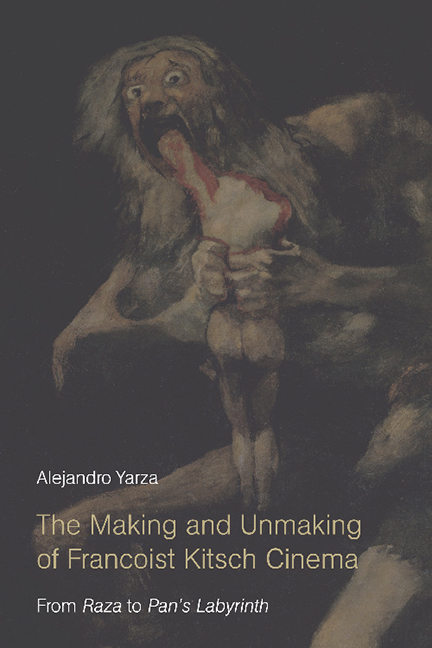Book contents
- Frontmatter
- Contents
- List of Figures
- Acknowledgments
- Preface
- Introduction
- 1 The Petrified Tears of General Franco: Kitsch and Fascism in José Luis Sáenz de Heredia’s Raza
- 2 Romancero Marroquí and the Francoist Kitsch Politics of Time
- 3 Los últimos de Filipinas: The Spatio-temporal Coordinates of Francoism
- 4 Surcos: Neorealism, Film Noir, and the Puppet Master
- 5 Franco, Ese Hombre: From Kitsch-Artist to Kitsch-Man
- 6 Viridiana: The World, the Flesh, and the Devil
- 7 Balada Triste De Trompeta: Of Ghosts and Clowns
- 8 Under the Sign of Saturn: The Labyrinth of Moral Choices in Francoist Spain
- Works Cited
- Index
7 - Balada Triste De Trompeta: Of Ghosts and Clowns
Published online by Cambridge University Press: 10 November 2020
- Frontmatter
- Contents
- List of Figures
- Acknowledgments
- Preface
- Introduction
- 1 The Petrified Tears of General Franco: Kitsch and Fascism in José Luis Sáenz de Heredia’s Raza
- 2 Romancero Marroquí and the Francoist Kitsch Politics of Time
- 3 Los últimos de Filipinas: The Spatio-temporal Coordinates of Francoism
- 4 Surcos: Neorealism, Film Noir, and the Puppet Master
- 5 Franco, Ese Hombre: From Kitsch-Artist to Kitsch-Man
- 6 Viridiana: The World, the Flesh, and the Devil
- 7 Balada Triste De Trompeta: Of Ghosts and Clowns
- 8 Under the Sign of Saturn: The Labyrinth of Moral Choices in Francoist Spain
- Works Cited
- Index
Summary
In the work of mourning, it is not grief that works: grief keeps watch
—Maurice Blanchot, The Writing of the DisasterBalada triste de trompeta [The Last Circus] (2010), Álex de la Iglesia's ninth feature film, recasts Francoist melancholy in a neo-Baroque, mournful light. As we saw in the previous chapter through Buñuel's Viridiana, Francoist melancholy served as a repressive political tool aiming to re-create the imagined glory of Spain's imperial past. Instead, Balada resorts to neo-Baroque aesthetics to mourn the victims of Spain's traumatic past.
In Sophocles's tragedy Antigone, Antigone dies in her attempt to give a proper burial to her brother Polyneices in defiance of Creon's edict. Polyneices had died during Thebes's Civil War against his brother Eteocles, who also died in battle. Unlike his brother who, celebrated as a hero, was buried with honors, Polyneices was declared a traitor of the state by Creon and left unburied on the battlefield. Franco's treatment of Republicans during the Spanish Civil War and in its aftermath tragically resembles Creon's treatment of Polyneices. Deemed traitors to the state, Republican victims of Franco were denied proper burial and ceremonial mourning. In fact, many of them—including internationally renowned poet Federico García Lorca—still lie in unmarked mass graves scattered throughout the country. Antigone's choice of pursuing a moral law higher than Creon's political decree to provide a dignified burial for her brother—resulting in her death—powerfully resonates in Spain's stubborn unwillingness to properly mourn her dead.
In Spain, the political transition to democracy during the late 1970s and early ‘80s was based on what was referred to as el Pacto del Olvido (the Pact of Forgetting). While instrumental in securing a peaceful transition from dictatorship to democracy, the Pact of Forgetting came at a cost. The price Spain paid for “closing the books” on its violent past was to leave large sectors of the Francoist administration, the judiciary as well as the police and the military virtually intact. An unwelcome by-product of the Pact was that the official Francoist narrative of the past—a narrative developed during the forty years of Franco's dictatorship, which gravely distorted Spain's historical record in order to legitimize its fascist past— remained unchanged and unchallenged.
- Type
- Chapter
- Information
- The Making and Unmaking of Francoist Kitsch CinemaFrom Raza to Pan's Labyrinth, pp. 203 - 260Publisher: Edinburgh University PressPrint publication year: 2017



